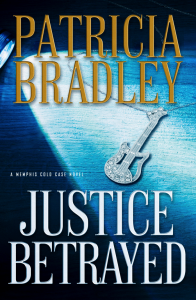by Patricia Bradley, @PTBradley1
Write what you know. We’ve heard that phrase so much, it’s become a cliché, and we often equate it with writing what we have personal knowledge of, as in a career. I’ve found writing what I know to mean much more.
When I sat down to start my first Natchez park ranger novel, I stared at the blinking cursor on the blank page for a good two days. It was as if everything I knew about writing had suddenly deserted me.
I paced a bit, got a cup of coffee, thumbed through a couple of craft books, and then remembered, write what you know. Okay, what did I need to know about the story? Before I can begin any story, I have to know my characters since my characters drive the plot.
That’s where I started to work—fleshing them out. And hit a wall. My heroine is a law enforcement park ranger, something I only know about from observing from afar. I have no personal information about the job. But I do know how to interview park rangers. I stopped in at the nearest headquarters and met the law enforcement ranger there and we talked a good while. She gave me her email address, and we communicated back and forth until I felt I had a handle on my heroine.
My hero is undercover Investigative Services Branch of the National Park Service. Since there aren’t many of them, I went about my research a little differently. I interview a couple of retired undercover cops with the Mississippi Narcotics Bureau and read the bio of another two undercover agents. If my heroine were a high wire walker, I’d interview the girl in the photo.
When you know nothing about a subject, find someone who does or a book they’ve written.
I had never been to Natchez, so that meant a trip. Natchez is one beautiful small city. I stayed long enough to know the routes I needed and to photograph different places where crimes would occur. One neat thing—there is going to be an archeological dig at one of the sites on the Natchez Trace. Guess who’s going to be part to it?
All right, so far I am not writing what I know. So where does it come in?
For me, the real meat of writing what I know comes into play with my characters’ emotions. While I’ve never killed anyone or even plotted to kill someone, I have had fantasies have plotted to get my own way about something. Haven’t you?
When I was much younger, I thought I knew what was best for almost everyone, and proceeded to plan the details. It’s only in looking back that I can see how wrong I was. But I vividly remember my single-minded focus to get what I wanted. Creating characters with that blind ambition works for your protagonists as well as your villains.
Another thing that helps me is remembering how it felt as a child or teenager to get caught doing something wrong. Or the emotions I went through when I covered up my wrong-doing. How I justified what I was doing and rationalized it even to myself. These are emotions we are all familiar with and are emotions we can pour into our characters. And not just antagonists—let your protagonists wrestle with blind ambition. They’re also flawed, after all.
In writing what you know, remember your own greatest desires and fears. Maybe you’re afraid of spiders—you can infuse that fear into a character. I was locked in closet one time and didn’t like being in enclosed places as a kid. Still, don’t. My heroine hates being in a place she can’t easily escape from. It was easy describing how she felt because I knew it.
I can still remember as a child when we had indoor plumbing installed in our house and lying in the bathtub, thinking that when I grew up I was going to fill the bathtub to the top of the rim—our dad wouldn’t let us run over two inches of water in the tub. The reason being, more water cost more money, something we didn’t have much of. That desire drove me for a lot of years. Give your characters that kind of drive.
Writing what you know: dig deep and take your experiences, your hurts, your fears, your desires and write them into your characters. Then, you will have believable characters readers can identify with. Even your villains.
It’s Elvis Week in Memphis, and homicide Detective Rachel Sloan isn’t sure her day could get any stranger when aging Elvis impersonator Vic Vegas asks to see her. But when he produces a photo of her murdered mother with four Elvis impersonators–one of whom had also been murdered soon after the photo was taken–she’s forced to reevaluate. Is there some connection between the two unsolved cases? And could the recent break-in at Vic’s home be tied to his obsession with finding his friend’s killer?
When yet another person in the photo is murdered, Rachel suddenly has her hands full investigating three cases. Lieutenant Boone Callahan offers his help, but their checkered romantic past threatens to get in the way. Can they solve the cases before the murderer makes Rachel victim number four?
 Winner of an Inspirational Readers’ Choice Award in Suspense and a 2018 Carol finalist, Patricia Bradley lives in North Mississippi with her rescue kitty, Suzy. Her romantic suspense books include the Logan Point series and the Memphis Cold Case Novels. She also has written sweet romances for Harlequin Heartwarming available as e-books.
Winner of an Inspirational Readers’ Choice Award in Suspense and a 2018 Carol finalist, Patricia Bradley lives in North Mississippi with her rescue kitty, Suzy. Her romantic suspense books include the Logan Point series and the Memphis Cold Case Novels. She also has written sweet romances for Harlequin Heartwarming available as e-books.



Comments 1
Patricia, this is one of those “keeper” posts! I know exactly how you feel about starting a new series. That’s my quandry right now. It’s like starting your writing life over again every single time. Thanks for the reminder that what we know can also be what we LEARN! Can’t wait to talk to you about Natchez!! Loved that place!